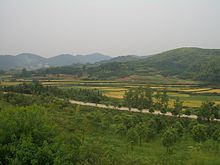Xianning
Xianning (simplified Chinese: 咸宁; traditional Chinese: 咸寧/咸甯; pinyin: Xiánníng) is a prefecture-level city in southeastern Hubei province, People's Republic of China, bordering Jiangxi to the southeast and Hunan to the southwest.
It was home to 2,462,583 inhabitants as of the 2010 census whom 512,517 lived in the built-up (or metro) area made of Xia'nan District.At the end of 2023 and the beginning of 2024, the permanent population will be 2.6084 million.
[8] During the Cultural Revolution, it was an important area for the Hunan, Hubei and Jiangxi Revolutionary Bases.
Most of the inhabitants of Xianning are Han; only 4,785 are from other ethnic groups including Hui, Tujia, Zhuang, Miao, Manchu, and Dong.
Niobium, gold, magnesium, antimony, monazite, coal, manganese, vanadium, mica, and marble are all mined or quarried in Xianning.
[16][citation needed] Xianning Nuclear Power Plant is under construction near Dafan Town, Tongshan County.
[citation needed] There are two passenger train stations on the "conventional" Beijing-Guangzhou line within the Prefecture-level city of Xianning - the Xianning Railway Station in urban area itself (80 kilometres (50 mi) from Wuhan's Wuchang train station), and the one in Chibi (118 kilometres (73 mi) from Wuchang) - are usually the first and the second stops for the slower trains leaving Wuchang toward Changsha and Guangzhou.
There are many sites including Taiyi Cave (太乙洞), Star Bamboo Sea (星星竹海), Mount Jiugong (九宫山, in Tongshan County), Lushui Lake (陆水湖), as well as the historical site the Chibi Ancient Ruins (赤壁遗址).
[23][citation needed] At the "Underground Project 131" site, some 15 kilometres (9.3 mi) southeast of downtown Xianning (within Xian'an District, tourists can visit a system of tunnels that were built in 1969-71 to accommodate national military headquarters in the case of a war, but never used.

